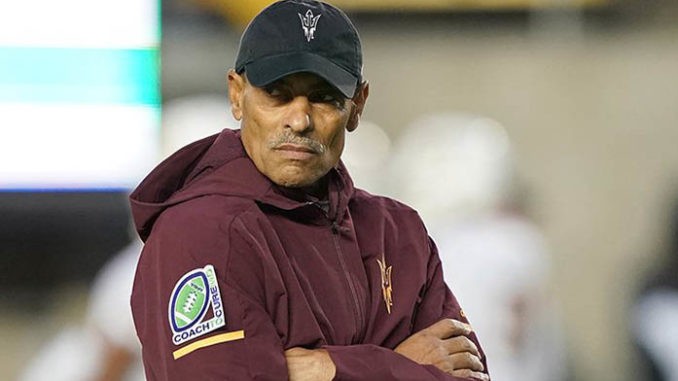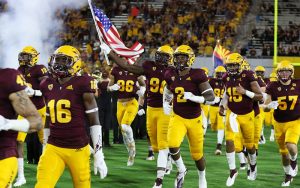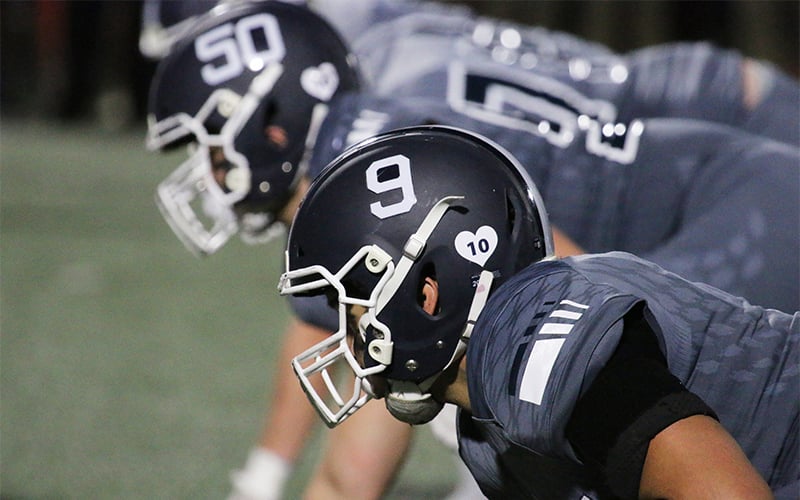
Even though Pac-12 football has stalled due to the ongoing pandemic, Herm Edwards is having important conversations daily with his players at a time when social justice issues are dominating the news.
The Arizona State football coach had his team meet with local police officers recently to address the current civil unrest across the nation.
“There has to be a conduct policy along with accountability and when the conduct gets to a place where it doesn’t represent your division, the guy has to go,” Edwards said. “You got to get him out and he can’t go somewhere else. And until you’re willing to do that, you can’t make change.”
Hundreds of students listened Monday to a virtual town hall with Edwards, who last summer joined ASU’s Walter Cronkite School of Journalism and Mass Communication as a guest lecturer. He and moderator William C. Rhoden, a longtime sports journalist, spoke about race and identity in sport.
The issues are important to Edwards. In June, three of his players were involved in racial conduct allegations that took place at a Whataburger near the ASU Tempe campus. The incident occurred at 11 p.m. just after the Black Lives Matter protests. Edwards said emotions were raw and high at the time among everyone. No one was hurt in the incident and things resolved quickly.
“Think about what you’re going to do when you decide to do something,” Edwards said. “How does it affect people?”
Edwards said he reminded his players the woman involved might have had a gun and thought she was about to get robbed.

“She sees three black guys and one black guy comes to her car. It’s dark and she doesn’t know you guys, and it’s 11 o’clock at night,” he told them. “If she had rolled down her window and shot somebody, she might have not been wrong.”
“I said, you got to think about what you do,” Edwards added, reiterating what he discussed in his meeting with players after the event occurred.
And realize, too, that they have a voice.
“I see people and young people of all different walks of life and different colors protesting, that’s the true America,” Edwards said. “They’ve got power, and they know they’ve got power because they can make change and it’s uplifting for me to watch.”
Protests against racial injustice are moving at a rapid pace across the nation during this unprecedented and divisive time. Civil rights activists have taken a stance and are demanding justice for the communities affected by racial inequality.
“Have the thought process of this,” Edwards said. “How can I better myself today?”
Edwards began his career in the NFL as a player in 1977. “At that point in time there were only eight minority coaches in the whole league, none of them were head coaches,” he said. “The players on the field, 30% were probably men of color, in today’s world in the NFL 73% are men of color.”
In 2001, Edwards became the head coach of the New York Jets. One game into the season, on Sept. 11, America was attacked. Edwards’ office was in sight of Laguardia airport and it occurred to him he hadn’t seen planes fly past his office within the hour. Moments later he turned on his TV and watched the Twin Towers collapse.
The Jets returned to train the next day as the schedule was still set in place.
“I go into the meeting on Wednesday to break the news to the players,” Edwards recalled. “I said, ‘I don’t know about playing, I know how I feel and I think a lot of you guys feel the same way I do.’
“Let’s go on the field and work this out,” Edwards said. “We go on the field and about 20 minutes into practice, there’s no life. I called them back in and said here’s what you guys do, you vote. If you don’t want to play and you want to forfeit the game, I got your back.”
That week, the Jets voted unanimously, Edwards said, to not play football that Sunday. Eventually the NFL postponed all games that week.
It was during this stressful, highly emotional period in American history, Edwards said, that he learned how important sports can be to a community. His Jets, along with every sports team in New York, spent weeks visiting firehouses and doing what they could to comfort grieving citizens.
Nearly two decades later, the connection between sports and society is still vivid. The Milwaukee Bucks on Aug. 26 led the NBA protest initiative. Other NBA teams, along with the WNBA, MLB, NHL and MLS, have used peaceful protests to communicate a powerful message about the Black Lives Matter movement and furthering social injustice.
“Until you are willing to have that conversation,” Edwards said, “or let people in the room that can give you a different perspective of other people, you’ll never gain knowledge. You stay stuck.”
Despite the uncertainty due to the ongoing pandemic, race and identity in sport has become a growing topic of discussion. Systemic racism has been a historical issue in the country and lack of diversity has been a very prevalent issue among sport communities.
“If people that are making the decisions look like each other and come from the same backgrounds, how can you ever be diverse?” Edwards said.
Many professional athletes are using their platform to educate, raise awareness and speak out on the current state of racial inequality in America.
Rhoden, a longtime New York Times sports columnist who is now a writer-at-large for The Undefeated, moderated the panel and asked Edwards to elaborate on this issue.
“Athletes have a beautiful platform at all levels and they aren’t afraid to use it,” Edwards said, “there has to be change, this is a movement.”
The NCAA and collegiate sports have also taken a stance on social injustice by giving their players a chance to use their platform to take action. Athletes can now place a memorial patch on the front and back of their jerseys in honor of the social justice movements, according to the NCAA.
Rhoden asked Edwards what his stance is in regards to his own players using their voices and how he is approaching having these conversations with his team.
“We encourage them to use their platform,” Edwards said, “be a voice of reason and solutions, we want them to be involved.”
Edwards added that this Friday is voter registration day for his athletes. He wants to ensure they all have the opportunity and access to vote and encourages them to do so in whichever way they’d like.
“You have to have allies,” Edwards said. “When you have a movement and are trying to make change you have to have allies that sit in those seats, that can make change.”
He described this current season of sports as a historical moment for a multitude of reasons.
“This will go down in history as the Covid season,” Edwards said, adding, “What do you do when you see it?”
There is plenty of uncertainty for this year’s football season as all Pac-12 sports are postponed this fall due to COVID-19. Edwards is hopeful they will still see a football season in 2021.
“We have to prepare to play, because there is going to come a time when we play,” Edwards said. “We can’t have the excuse of ‘I didn’t know there wasn’t going to be a season.’ There is going to be a season, we just don’t know when it’s going to start.”

